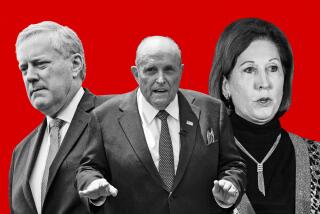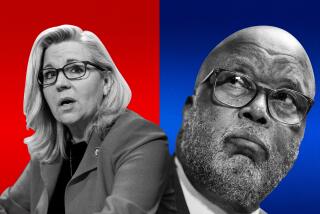Board Will Oversee NYC Site Rebuilding
- Share via
A heavy-hitting panel of Wall Street executives and others with deep roots in lower Manhattan and the Republican Party were named Thursday to oversee the reconstruction of the World Trade Center site.
New York Gov. George Pataki and outgoing Mayor Rudolph W. Giuliani selected the Lower Manhattan Redevelopment Corp. board, which will direct the design of the area that was destroyed in the Sept. 11 attacks and the allocation of billions of dollars in federal, state and private funds for the work.
John Whitehead, a former Goldman, Sachs & Co. senior partner and GOP fund-raiser, will chair the group. Also named were Roland Betts, former owner of the Texas Rangers baseball team and college roommate of President Bush; Dick Grasso, chairman and chief executive of the New York Stock Exchange who is considered the “voice” of Wall Street; and Frank Zarb, the former chairman and chief executive of Nasdaq.
The board faces thorny challenges, both in obtaining and divvying up financing to rebuild the site, and in weighing contrasting wishes and proposals for the site and surrounding neighborhoods.
Some think skyscrapers should be re-erected; others believe shorter buildings would be less vulnerable and more appropriate. Still others think the emphasis should shift from a commercial site to a cultural and retail area. All agree on the need for a proper memorial at a spot where many will remain buried, but even that design is sure to engender fierce debate.
Federal aid packages moved forward this week, aimed primarily at boosting lower Manhattan’s sagging economy as well as rebuilding subway lines, office buildings and other infrastructure. The House of Representatives on Wednesday approved $2.5 billion in economic-development grants for lower Manhattan. On Thursday, additional legislation was proposed in the House that would create a $6.1-billion package of tax breaks and other incentives for a “Liberty Zone” that would take in the attack site and surrounding neighborhoods. The Senate must approve both pieces of legislation.
In addition to any federal money, Whitehead said he also would seek private financing and would be speaking with the heads of many major businesses that were displaced by the attacks, urging them to remain in lower Manhattan.
Larry Silverstein, who heads a consortium that took over the 99-year-lease on the World Trade Center complex in July, has said he would like to begin rebuilding by next year. But Whitehead said it was unlikely rebuilding would start within the next year. He asked for patience on the rebuilding plans, noting that recovery efforts for people who died at the site were still underway, as well as a massive cleanup.
“This is a huge undertaking,” said Whitehead, who is also former deputy secretary of State under President Reagan. “We want this to be done right . . . . What we do down there in the next couple of years is going to last for the next 100 years.”
Giuliani, who declined the top post on the panel, selected four of the board members. Besides Grasso, they include Robert Harding, his deputy mayor for economic development and finance who is the son of his confidant Ray Harding; Howard Wilson, chairman of the city’s school reconstruction authority and a former colleague of the mayor in the Justice Department; and Paul Crotty, a Verizon Communications executive who is Giuliani’s former corporate counsel.
Others said the group, which includes no family members of those lost at the site and few residents of lower Manhattan, seemed heavily focused on the business world.
“It’s mostly a private-sector group,” said Kathy Wylde, president of the New York City Partnership, a coalition of more than 200 of the city’s top business, education and civic leaders. “I think the message is not too different than the message of the recent mayoral election, when people concluded that because of the economic climate it was a good idea to have a businessman as mayor.”
Incoming Mayor Michael Bloomberg said he had been consulted by Pataki and Giuliani and was pleased with the board selections.
There is only one minority on the panel, Deborah Wright, chief executive of Carver Federal Savings Bank and former president of the Upper Manhattan Empowerment Zone Development Corp., which oversees revitalization in Harlem.
In addition to Wright, one other woman was named. Madelyn Wils is chairwoman of a community government board in lower Manhattan and an area resident who was evacuated after the attacks.
Wils said she thinks it would be “a mistake” to rebuild tall business towers, saying they had created “a wall” between diverse residential and shopping neighborhoods in lower Manhattan.
More to Read
Sign up for Essential California
The most important California stories and recommendations in your inbox every morning.
You may occasionally receive promotional content from the Los Angeles Times.













